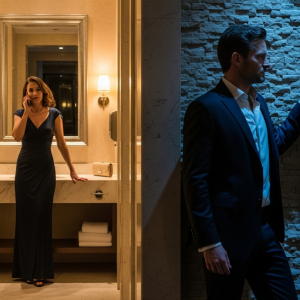The California sun, a benevolent eye in the vast, cloudless sky, cast a golden glow over the manicured lawns and pristine houses of the suburban neighborhood. It was a picture of tranquility, a carefully constructed diorama of middle-class American life. Inside one of these white-walled, two-story houses, Jennifer Cooper was orchestrating the familiar chaos of a weekday morning.
“Tyler, have a great day at school today,” she said, her voice a warm melody against the clatter of breakfast dishes. She placed a gentle hand on her nine-year-old son’s shoulder, a gesture of love and reassurance that had become a cherished ritual.
Tyler, his face a canvas of childhood innocence, beamed up at her. “I will, Mom! I love you,” he chirped, planting a quick, sticky kiss on her cheek. “I have a math test today, but I’m sure I’ll get a good grade.”
Jenny’s heart swelled with a familiar pride. He was a good boy, honest and bright. Her neighbors often commented on his impeccable manners, calling him a “promising young man.” Each compliment was a small victory, a testament to her devotion as a mother.
“Be careful on your way,” she called after him as he skipped out the door, his backpack bouncing with each enthusiastic step. “I’ll be at the library until pickup time.”
Jenny found solace in her work as a librarian, a quiet sanctuary amidst the hushed whispers of turning pages. She reveled in the quiet dignity of the place, the scent of old paper and ink a comforting perfume. She found joy in guiding young minds through the labyrinth of stories, in the wide-eyed wonder of a child discovering a new world within the pages of a book.
As she brewed her morning coffee, her thoughts drifted to her husband, Mark. An accountant at a local firm, he was a man of precision and routine, a pillar of stability in their lives. Ten years of marriage had woven a comfortable tapestry of shared memories and unspoken understanding. Lately, however, a subtle thread of unease had begun to unravel their familiar pattern. Mark seemed distant, a shadow of his former self.
“I’m just tired from work,” he had mumbled the previous night, his voice muffled by the pillow as he turned away from her. “It’s a busy season.”
Jenny had accepted his explanation, attributing his fatigue to the demanding nature of his profession. She believed in the ebb and flow of a long-term relationship, the quiet understanding that allowed for periods of distance and introspection.
The afternoon sun was beginning its slow descent when Jenny’s phone buzzed, the shrill sound a jarring intrusion into the library’s peaceful silence. The caller ID displayed “Willowbrook Elementary School.” A knot of dread tightened in her stomach. A call from the school during class hours was never good news.
“This is the nurse’s office at Willowbrook Elementary,” a frantic voice on the other end of the line said. “It’s about your son, Tyler.”
Jenny’s hand trembled, the receiver suddenly slick with sweat. “Yes, this is his mother. Is everything alright?”
“Tyler suddenly vomited and collapsed during his math class. He’s conscious, but he’s very pale and complaining of nausea. We’ve called for an ambulance, but we need you to come to the school immediately.”
Jenny’s world tilted on its axis. The familiar, comforting world she had so carefully constructed was crumbling around her. She mumbled a hasty apology to her colleagues, her mind a whirlwind of fear and confusion. What could have happened to her vibrant, healthy son?
The drive to the school was a blur of frantic thoughts and prayers. Jenny’s mind raced, replaying the morning’s events, searching for any sign, any clue that might have foretold this sudden turn of events. Was it something he ate? A virus? Or something more sinister?
Her first instinct was to call Mark, to share the crushing weight of her fear. She fumbled for her phone, her fingers clumsy with panic.
“Mark, it’s Tyler,” she began, her voice cracking with emotion. “He’s collapsed at school. They’re taking him to the hospital.”
The silence on the other end of the line was a cold, hard slap in the face. When he finally spoke, his voice was devoid of any emotion, a chillingly detached monotone.
“I’m at work, Jennifer. You’re his mother. You handle it.”
The line went dead, leaving Jenny in a state of stunned disbelief. The cruelty of his words, the casual dismissal of her pain, was a betrayal that cut deeper than any physical wound. In that moment, she was utterly alone, adrift in a sea of fear and uncertainty.
When she arrived at the school, the flashing lights of several police cars confirmed her worst fears. Something was terribly wrong. The school principal, Mrs. Johnson, met her at the entrance, her face a mask of grave concern.
“Mrs. Cooper, I’m so sorry,” she said, her voice heavy with unspoken sympathy. “Tyler has been taken to St. Mary’s Hospital. There’s a detective here who needs to speak with you.”
A man in a crisp suit stepped forward, his expression a mixture of professionalism and compassion. “I’m Detective Johnson,” he said, his voice calm and reassuring. “We’re conducting an investigation as a precaution. Please, have a seat.”
He led her to a small office, the air thick with tension. Jenny’s heart pounded against her ribs, a frantic drumbeat of fear. An investigation? Why would the police be involved in a simple case of food poisoning?
“I’m sorry to have to tell you this, Mrs. Cooper,” the detective began, his voice gentle but firm, “but Tyler’s symptoms are not consistent with a simple illness. The doctors at the hospital have reason to believe that he may have been poisoned.”
The word hung in the air, a venomous serpent coiling around Jenny’s heart. Poisoned? It was a word from a different world, a world of darkness and malice that had no place in her quiet, suburban life.
“That’s ridiculous,” she stammered, her voice a barely audible whisper. “Who would want to harm my son?”
Detective Johnson’s eyes softened with a flicker of sympathy. “To help us answer that question, we need you to look at some security camera footage.”
He turned a tablet screen towards her. The grainy image showed the school playground, a familiar scene of childhood innocence. But as the footage played, a sense of dread washed over her. A woman, her back to the camera, approached the area where the children’s water bottles were kept. She moved with a furtive grace, her movements quick and deliberate.
“Wait,” Jenny said, her voice catching in her throat. “I know that woman.”
The woman turned, and Jenny’s world shattered into a million pieces. It was Sarah Williams, her friend, her confidante, the woman she had trusted with her deepest fears and insecurities. In the footage, Sarah produced a small syringe from her purse and, with a chillingly practiced motion, injected a clear liquid into Tyler’s water bottle. The act was so swift, so calculated, that it sent a shiver of ice down Jenny’s spine.
“Sarah? Why?” she whispered, the words a desperate plea for an explanation that would never come.
The truth, when it finally unraveled, was a tapestry of betrayal and deceit far more intricate and devastating than Jenny could have ever imagined. The investigation revealed that Mark and Sarah had been engaged in a clandestine affair for several months, their secret trysts a dark undercurrent beneath the placid surface of their suburban lives.
The late-night phone calls, the hushed conversations, the sudden preoccupation with his phone – it all made a sickening kind of sense now. Mark’s emotional distance, his cold indifference to her pain, was not the result of work-related stress, but the consequence of a heart that had been given to another woman.
The interrogation of Sarah revealed a mind twisted by jealousy and a possessive love that had festered into a dangerous obsession.
“I loved him,” she confessed, her voice a chillingly calm monotone. “I wanted a life with him, a real family. But as long as Tyler was in the picture, that would never happen.”
Her words were a venomous cocktail of delusion and self-pity. She saw Tyler not as an innocent child, but as an obstacle, a symbol of the life she coveted and could never have. Her jealousy had become a cancerous growth, consuming her reason and compassion until all that remained was a cold, calculating desire for revenge.
The most damning piece of evidence came from a series of text messages between Mark and Sarah, a digital trail of their illicit affair. In one exchange, Sarah had written, “If only Tyler wasn’t in the way, we could be a real family.”
Mark’s reply was a chillingly ambiguous, “I know.”
He had not actively participated in the poisoning, but his silence, his tacit approval of Sarah’s twisted desires, made him an accomplice in the eyes of the law. He had chosen his own selfish desires over the safety and well-being of his own son, a betrayal so profound that it left Jenny speechless.
The trial was a blur of legal jargon and tearful testimonies. Jenny sat through it all, a silent spectator to the public unraveling of her life. She listened as the prosecution laid out the sordid details of the affair, the calculated cruelty of the poisoning, and the web of lies that had been spun to conceal the truth.
In the end, justice was served. Sarah was sentenced to five years in prison for her heinous crime. Mark, stripped of his professional license and his reputation, was given a suspended sentence, a hollow victory that did little to ease the ache in Jenny’s heart.
In the months that followed, Jenny and Tyler began the slow, arduous process of rebuilding their lives. They moved to a small apartment near the library, a cozy haven where they could begin to heal the wounds of the past. The large, empty house, once a symbol of their happy family life, was now a painful reminder of all that they had lost.
Tyler, with the resilience of a child, slowly began to emerge from the shadow of his trauma. With the help of a kind and patient therapist, he learned to process his feelings of fear and betrayal, to find his voice again in a world that had suddenly become a dark and unpredictable place.
Jenny found solace in her work, in the quiet rhythm of her days at the library. Her colleagues, who had been a source of unwavering support throughout the ordeal, became her second family, their kindness a soothing balm on her wounded soul.
One evening, as they were working on Tyler’s homework, he looked up at her, his eyes shining with a newfound wisdom.
“Mom,” he said, his voice soft but clear, “we’re stronger together, aren’t we?”
In that moment, Jenny knew that they would be okay. They had lost so much, but they had also gained something precious – a bond forged in the fires of adversity, a love that was strong enough to weather any storm.
They had learned that family was not defined by blood or marriage, but by the unwavering support of those who stand by you in your darkest hour. They had discovered a strength they never knew they possessed, a resilience that would carry them through the challenges that lay ahead.
As the sun set on another day, casting a warm, golden glow over their small apartment, Jenny looked at her son, her heart filled with a love that was both fierce and tender. They were survivors, two souls bound together by a love that had been tested and proven true. And as they faced the future, they did so with a quiet confidence, knowing that as long as they had each other, they could overcome anything.
The months after the trial were a strange mix of suffocating quiet and uninvited noise.
On the surface, life resumed its familiar patterns: the morning rush for school, afternoons at the library, dinners at the small round table in their apartment. But underneath, a constant hum of unease lingered — the kind that comes from knowing the people you once loved most were capable of doing the unthinkable.
Jenny found herself scanning the grocery store aisles for familiar faces, her pulse spiking whenever a man in a navy suit vaguely resembled Mark. She avoided certain neighborhoods altogether. And when the phone rang with an unknown number, she let it go to voicemail. Some boundaries, she decided, didn’t need explaining.
The community’s reaction had been its own trial. At first, the support was overwhelming — casseroles from neighbors, gift cards for groceries, a flood of sympathetic notes from parents at Tyler’s school. But sympathy has a short half-life in the suburbs.
By the third month, whispers had replaced casseroles. Jenny overheard them in the library sometimes, patrons leaning over the front desk to ask her coworkers questions they wouldn’t dare pose to her directly. How much did she really know? Was she blind, or was she covering for him?
Jenny didn’t bother defending herself anymore. She learned quickly that people will believe whatever version of the truth makes them feel safest.
Tyler, meanwhile, was relearning how to be a kid. His first few weeks back at school had been tentative — lunch eaten at the edge of the cafeteria, eyes flicking to every movement. But with each passing month, the shadows faded a little. Soccer practice helped. So did his therapist, who introduced him to journaling.
One evening, Jenny found his notebook left open on the coffee table. In his uneven, nine-year-old handwriting, he had written:
“Bad things happen. But that doesn’t mean good things can’t happen too.”
She didn’t cry often anymore, but that night she did.
Mark had made no attempt to contact them since the trial, and Jenny knew better than to mistake that for remorse. His absence was a relief, but also a grim reminder that Tyler’s father had chosen self-preservation over his own child. Sometimes, late at night, she would think back to the morning of the poisoning — the way Mark’s voice had sounded so flat, so unwilling to share the burden of her fear — and it would twist in her gut like fresh betrayal.
But grief, Jenny realized, was not just about losing someone. It was also about losing the idea of them.
She and Tyler started new traditions, ones that belonged entirely to them. Saturday morning pancakes. Tuesday library movie nights after closing. A small garden of potted herbs on the balcony, where Tyler took charge of watering. They celebrated holidays quietly, just the two of them, making their own rules.
The apartment began to feel less like a stepping-stone and more like a home. Jenny hung framed photos of their trips to the beach, of Tyler in his soccer uniform, of sunsets they’d watched together. There was no trace of Mark in any of it.
One spring afternoon, nearly a year after the trial, Jenny received a letter in the mail with no return address. The handwriting was unmistakable: Mark’s. Her first instinct was to throw it away unopened, but curiosity won.
Inside was a single sheet of paper.
“Jennifer, I’m sorry for what happened. I never meant for Tyler to get hurt. I was in over my head. I hope someday you can explain to him that I loved him, in my own way.”
Jenny read it twice, then set it down. She felt… nothing. Not anger, not relief. Just the certainty that whatever “love” Mark thought he’d given was not the kind her son needed.
She tucked the letter into a folder marked Legal Documents — not because she wanted to keep it, but because she wanted a record of who he really was.
Life didn’t go back to the way it had been — and Jenny didn’t want it to. She found a quiet strength in simplicity. When she locked the apartment door at night, she knew it would still be her space in the morning. When she looked at Tyler, she saw a boy who had been through more than most adults and had come out the other side with empathy still intact.
That summer, they took a short trip to Monterey Bay. Tyler stood at the edge of the tide pools, pointing out crabs and sea stars with the same wide-eyed enthusiasm he’d had before his world tilted off its axis. Jenny took a picture — not for social media, not for anyone else, but because she wanted to remember the exact shade of joy on his face.
On their last night there, they sat on the beach watching the sun melt into the Pacific. Tyler leaned against her shoulder.
“Mom?”
“Yeah?”
“I think we’re gonna be okay.”
Jenny smiled into the wind. “We already are.”
And for the first time since the day her phone rang at the library, she believed it completely.




